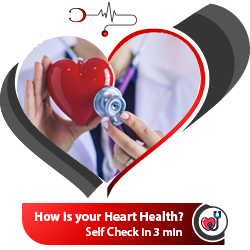When Should You Consider Getting a Heart Checkup?
Regular heart checkups and screenings give you the most critical opportunity to receive proper treatment and quickly detect any underlying medical issues. Opting for these health services will ensure that you take the appropriate measures for a longer, healthier life. Regular heart examinations and health screenings can help detect even the slightest change in your heart condition and its associated risk factors before it becomes more serious. Preventative healthcare allows you and your doctor to be proactive and address any potential health problems early.
When should you consider getting a heart checkup?
Even if you do not suffer from heart-related conditions, you should go for regular checkups. In today's hectic life, even youngsters in their 20s face many health conditions, including heart attack, diabetes, hypertension and obesity, making it essential must be careful about health. Routine checkups help identify possible risk factors at an early stage that could lead to cardiac diseases. During the screening, tests are conducted by the doctor to evaluate the risk factors, and a suitable treatment plan will be formulated. The treatment plan may include modifications to lifestyle or medication, or both.
What to expect during a heart checkup?
At a heart health examination, your physician will check your general health parameters and provide you with screening tests to evaluate your cardiovascular health and risk elements. Your cardiovascular system involves your heart and vessels.
As part of the inspection, they will search for any signs of heart disease and evaluate your risk of getting heart disease in the future. For example, risk factors can include:
- High blood pressure:
A blood pressure assessment is conducted to determine if a person has high blood pressure. Higher blood pressure puts a more significant burden on the heart and potentially damages the blood vessels. Left untreated, it can lead to causing blood clots forming, increasing the risk of a heart attack or even heart failure.
- High blood cholesterol:
It is essential to get your cholesterol levels checked during your twenties. Although there may not be any signs of high cholesterol, testing is necessary to understand your risk. It is recommended to have this test done every 4-5 years.
- High blood glucose:
A blood glucose test assesses the amount of sugar (glucose) in the blood. It is also a way to identify diabetes. If left untreated, diabetes can add up to the possibility of heart issues and stroke.
- Being overweight or obese:
Individuals battling with obesity require more blood to transport oxygen and nutrients throughout their bodies, which can lead to higher blood pressure. The doctor will assess your body mass index (BMI) to assess if you are obese. A BMI of 30 or more is obesity; the higher it goes, the greater the health risks. Having your BMI checked at least once a year is essential as this can help identify any potential health risks and the best treatment options.
- Certain lifestyle factors, such as smoking and drinking:
Consuming a diet with a high amount of saturated fats, trans fats, and cholesterol has been correlated with heart diseases and related difficulties, like atherosclerosis. In addition, excessive salt in one's diet can increase blood pressure. Insufficient physical activity can also affect your heart health and lead to heart issues. Unhealthy habits such as smoking and drinking should be stopped to make room for a healthy heart.?
When to get your heart tested?
It is suggested that people should begin testing for cardiac health at 20. Other tests may not be necessary until a later age. Your doctor can advise you which tests and how often to get those done. You may periodically go for a preventive health checkup which actually becomes a beneficial health investment.
- Even if you have no prior history or family history of heart disease, the AHA recommends people regularly undergo cholesterol, blood pressure, and glucose tests, commencing at 20s.
- Additionally, a BMI measurement must be taken based on body weight.
- If you carry certain risk factors for heart disease or have a strong family history, your doctor may recommend starting the screenings before the usual age.
The experts are here!
Going for a yearly Whole body checkup will ensure your health quotient and warn about silently creeping in health risks. Indus Health Plus brings you health packages which are designed to suit different age groups, health conditions and requirements. You can simply go for a checkup that covers all essential tests. If you need support from an authentic team of medical experts to get a genuine report on your heart health, contact Indus Health Plus today! Fill up the query form and our team will get in touch with you to help you choose the right medical checkup.










